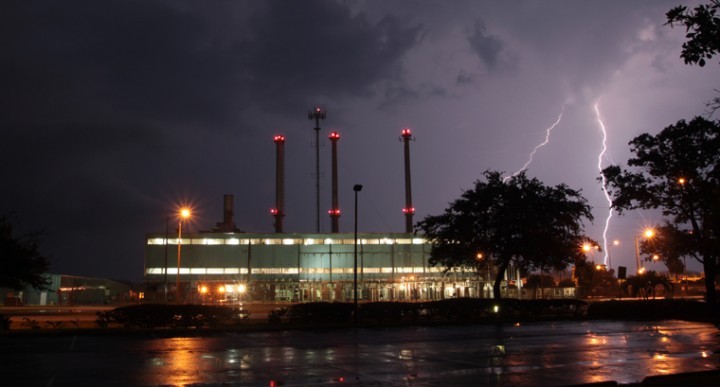VERO BEACH — A legal battle over the future of the Vero Beach electric territory was poised to resume at the end of the month, but it appears that the parties have agreed to hold off a few months in the hope that the utility sale to Florida Power and Light will indeed move forward.
In the meantime, while Vero’s 34,000 electric customers wait until mid-February for the statewide power co-op to add its two cents to the FPL sale, at least the city, county and the Indian River Shores won’t have to amass legal teams to fight over the scope of Vero Electric’s territory outside the city limits.
If the Vero Beach City Council agrees on Tuesday and the regulatory agency concurs, a complaint asking the Florida Public Service Commission to carve out the 20,000 South Beach, Indian River Shores and mainland county customers from Vero electric – freeing them to be served by FPL – could hang out there as long as Sept. 14.
A full 61 percent of the city’s electric customers, but closer to 70 percent of its $89 million electric utility revenues, come from outside the city limits.
Florida Municipal Power Agency President Nick Guarriello announced that the FMPA had responded verbally to an offer by FPL to fast-track the sale and that the FMPA would discuss the Vero sale in January with a possible vote in February.
FPL President Eric Silagy on Aug. 20 offered several concessions to FPMA to sweeten the deal, including untold millions in cash from FPL. The big blank to be filled in by FMPA is how much cash it will take to persuade the co-op to let Vero out of its membership and its long-term obligations.
The news of at least a verbal response by the FMPA prompted utility activist and Moorings resident Dr. Stephen Faherty to reconsider actively pursuing a complaint he and CPA Glenn Heran have on ice with the PSC.
“I contacted Wayne (Vero Beach City Attorney Wayne Coment) to see if the city would be agreeable to keeping the complaint in abeyance a little while longer because the response from the FMPA is still pending,” Faherty said. “It might not stay in abeyance until September if no progress on the sale is made, but at least until after the FMPA’s February meeting and the City Council has a chance to consider the terms the FMPA comes back with.”
Though FPL received a verbal response from the FMPA, the company’s officials have given no indication whether or not the FMPA’s demands are realistic, or even in the ballpark of what FPL is willing to pay.
“We don’t expect to have any more information until after the New Year,” FPL External Affairs Director Amy Brunjes told Vero Beach 32963 last week.
After being on hold for three years, the PSC complaint is set to expire at the end of January if no action is taken.
Faherty and Heran had already obtained support from the Board of County Commissioners to join the PSC complaint and, though less committed, the Indian River Shores Town Council had expressed interest in theory in joining the effort, too.
“We’re waiting to see if the deal that the FMPA is offering is cost-prohibitive for FPL,” Heran said.
“If the deal is so cost-prohibitive that FPL can’t do anything, we’ll pursue the petition and all other avenues including putting greater scrutiny on the FMPA,” Heran said. “Specifically, we would raise public awareness, questioning what public purpose they serve when no member – none of their 20 owners of the power entitlements – can compete with FPL rates.”
Vero’s rates currently sit at nearly 40 percent higher than FPL and at their worst rose to 58 percent higher than what FPL customers pay for the same power.
Heran said the rate disparities paid by the state’s 3 million municipal electric customers cost the Florida economy hundreds of millions of dollars each year.
Of those 3 million customers, 20 percent or 600,000 of those live outside the city limits of the municipalities that own the utilities. Those utilities skim off $270 million in direct transfers to pad their general funds, including $5.6 million per year for Vero.
Vero City Attorney Wayne Coment prepared a proposed agreement for the City Council to enter into with Heran and Faherty to adopt a wait-and-see approach to give FPL and the FMPA a chance to make the deal on the table work.
“The … negotiations between City and FPL remain ongoing and final resolution is being actively pursued with interested third-parties to the transaction. It is hoped that a firm closing date for the potential sale transaction will soon be established,” Coment wrote in the proposed agreement. “By continuing the formal proceedings in abeyance, the parties can avoid having to file pleadings and engage in other procedural activities such as discovery at this time and the City can concentrate its efforts on due diligence and negotiations with FPL regarding the potential sale and purchase transaction.”
This would be the third time the parties have mutually agreed to hold off on proceeding with the case, which was granted standing by the PSC in 2009.
County Attorney Dylan Reingold prepared an update for the county commission for Tuesday’s meeting.
“Based upon the recently proposed hearing dates by the FMPA, and the proposed request to continue the abeyance of the Faherty/Heran PSC case, the County Attorney’s Office recommends 1) monitoring the hearings and action taken by the FMPA in January and February 2014, as such an action could make any further action by the Board moot, and 2) directing the County Attorney’s Office to report back to the Board in March on the status of the City electric system issue,” Reingold wrote to the commissioners.
The move would save all sides having to put up costly retainers for out-of-town attorneys specializing in utility matters.
Heran has estimated that it could cost more than $150,000 to fight all the city’s anticipated objections.

